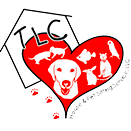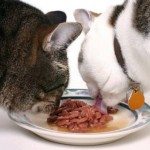Cat Feeding Recommendations
The general public, scientists and veterinarians have recommended for years to feed cats like dogs; free choice dry food or meals of dry with some wet. Finally after years of this misaligned thinking, food standards for cats have changed. To understand why our standards have changed, we must understand cats.
Cats are “obligate” carnivores which means they depend on nutrients solely from animal flesh for their survival. They are hunters of meat and would eat small rodents and birds multiple times daily if they were not domesticated. A cat’s stomach is designed for these small frequent meals. Cats get their water from the animals they eat and do not drink much in the wild. They also lack specific digestive enzymes which make them less able to digest and absorb energy from carbohydrates compared to proteins. Due to these facts, we recommend a canned grain free diet with protein as the number one ingredient and that they should eat many small meals throughout the day. Cats can eat dry food, but should get most of their water from wet food rather than drinking.
Our recommendations for feeding cats are as follows:
Feed small frequent meals throughout the day.
Ideally 3+ meals of a GRAIN-FREE canned food.
If it is not possible to do only canned food multiple times throughout the day,
then we recommend keeping a dry grain free food out for your cat at all times.
This allows them to have so they snacks or small meals along with their 2 canned meals a day.
In order for cats to get enough essential fatty acids in their diet
we recommend feeding them 1 can of wild caught canned salmon per week
OR supplementing their diet with pure DHA
(omega 3 fatty acids—we carry a couple of quality products here).
posted: December 02, 2011 by: McClintock Animal Care Center

